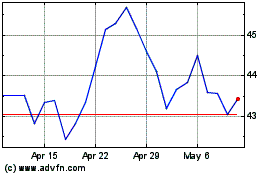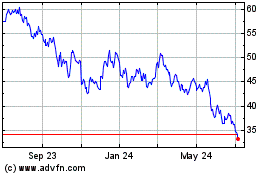By Heather Haddon and Preetika Rana
Applebee's is ringing up hundreds of thousands of dollars in new
sales a week for wings made in the chain's kitchens. But the
Cheetos-coated chicken isn't sold in its actual restaurants or
directly under its name.
The new dish made by Applebee's cooks is only offered for online
delivery nationwide through Uber Eats and under the brand Cosmic
Wings. The wings, developed with PepsiCo Inc.'s Frito-Lay division,
are aimed at younger consumers who want late-night food that sounds
cool, executives from the casual-dining chain said.
So-called virtual brands have mushroomed on food-delivery apps
during the Covid-19 pandemic. Uber Technologies Inc.'s Eats
division said it has more than 10,000 brands on its U.S. platform,
up from more than 3,000 at the start of 2019 -- most of them run by
existing restaurants. DoorDash Inc. said it has added many
online-only brands in the past year. Casual-dining chains have used
them to try to attract new customers less interested in their
vintage parent brands.
"To make an impression, you have to be original and fresh," said
John Peyton, chief executive officer of Applebee's parent, Dine
Brands Global Inc. Cosmic Wings has done better than another
online-only wings brand tested by Applebee's Neighborhood Grill
& Bar under its own name, he said.
Local sandwich shops, major chains and Michelin-starred chefs
are cooking up online-only brands from their kitchens, tapping
existing staff, equipment and food to broaden delivery options as
the health crisis brought a year of restrictions to their dining
rooms. The virtual brands also provide a low-cost way for
restaurants to try to boost sales without building new spaces.
Chili's parent Brinker International Inc. started It's Just
Wings during the pandemic and expects $150 million in annual sales
of dishes such as fried Oreos through its virtual brand. Younger
male gamers have particularly taken to the wings delivery,
executives said. Red Robin Gourmet Burgers Inc. is also slinging
chicken with virtual brands, including Chicken Sammy's and the Wing
Dept. Outback Steakhouse parent Bloomin' Brands Inc. said it
expects its Tender Shack online-only chicken brand to do $75
million in annual sales as it rolls out nationally.
Virtual brands are distinct from so-called ghost, or cloud,
kitchens, which are commercial spaces rented specifically to
fulfill delivery orders. Some restaurants are joining with ghost
kitchen operators to expand their online-only brands.
Virtual brands and ghost kitchens could account for 6% to 8% of
global food and drink spending by 2030, or $1 trillion in sales,
said Euromonitor analyst Michael Schaefer, who initiated coverage
of the sector for the market research firm about a year ago. Growth
will depend on delivery getting cheaper and faster, neither of
which is certain, Mr. Schaefer said.
Delivery apps such as Uber Eats and DoorDash are crunching
search data to act as consultants, advising restaurants on what
food is in demand in different neighborhoods to create virtual
brands that address gaps in specific markets.
For example, scores of people in a certain neighborhood might be
searching Uber Eats for more breakfast options, such as avocado
toast, but walk away empty-handed, said Kristin Patterson, Uber
Eats' head of enterprise sales in the U.S. Eats consults
restaurants on the kinds of foods people are eating, what time they
are eating and who is eating -- whether it's large groups or
individuals, she said.
DoorDash also advises restaurants on the kinds of foods that are
popular and whether their ideas are "overlapping or cannibalizing
with existing merchants," said Ashlee Tran, the company's merchant
strategy and operations director.
As the health crisis abates, restaurants are trying to figure
out how much their to-go investments will stick -- drive-throughs,
tech-enabled pickup services and delivery have boomed during the
pandemic. Many restaurants say they can balance cooking online-only
menus even after dining rooms reopen.
Some have designed online menus around less popular items or
side dishes on their in-store menus, which means staff use
different parts of the kitchen to make them. Others have designed
meals in a way that they drive business during parts of the day
that are slower for in-store traffic.
Michelin-starred chef Michael Mina, who previously shunned
delivery but started online-only brands during the pandemic, said
he turned his San Francisco-based Japanese restaurant Pabu into a
station for making food for Tokyo Hot Chicken, his first virtual
brand. He began Bourbon Burger Bar, grilling patties on the
restaurant's charcoal grill.
Mr. Mina said he plans to continue experimenting with delivery
after his dining rooms reopen, though he won't go too far afield.
"We probably wouldn't revamp the kitchen at Pabu to do pizza," he
said. "But cooking burgers on a grill, that works."
It can be tricky for a well-known brand to cast a wider net
under a different name. Casual-dining chains say they are being
transparent that the food is made in their kitchens, but customers
don't always know.
Kim Kelley, a 43-year-old marketing worker from St. Louis,
ordered $34 in burgers and shakes from the Burger Den virtual brand
earlier this month. She was surprised to learn later that her food
was made at Denny's Corp. instead of a local restaurant.
"I feel like they were being a tad deceitful," Ms. Kelly said.
"If I'm going to waste $10 on delivery and service fees, I may as
well keep it local."
Denny's has sought to clearly highlight the connection between
the chain at its virtual brands, the Meltdown and the Burger Den,
while also giving them their own identities, said John Dillon, the
company's chief brand officer.
DoorDash recently began labeling virtual brands on its platform,
as consumers wanted that transparency, Ms. Tran said.
Some restaurateurs and industry analysts worry about the ease of
throwing up online-only brands, saying it is eroding what makes
restaurants special.
André Vener, co-founder of California-based Dog Haus, said he
learned that restaurants need to market their virtual brands as
much as a physical location after his first attempt didn't generate
expected sales. Following an online marketing blitz, his company's
next virtual brand helped sales to rise fourfold at the restaurant
hosting it, he said.
Some virtual brands are doing so well that their creators are
reverse-engineering a physical footprint. Brinker is now doing It's
Just Wings online order pickup at its restaurants.
Krispy Rice, one of the virtual brands born out of Umami Burger
kitchens last year, is opening its first bricks-and-mortar store,
said Sam Nazarian, CEO of Creating Culinary Communities, which owns
several brands including Umami Burger.
"At some point people want to know the DNA of your brand," he
said.
-- For more WSJ Technology analysis, reviews, advice and
headlines, sign up for our weekly newsletter.
Write to Heather Haddon at heather.haddon@wsj.com and Preetika
Rana at preetika.rana@wsj.com
(END) Dow Jones Newswires
March 28, 2021 10:14 ET (14:14 GMT)
Copyright (c) 2021 Dow Jones & Company, Inc.
Dine Brands Global (NYSE:DIN)
Historical Stock Chart
From Mar 2024 to Apr 2024

Dine Brands Global (NYSE:DIN)
Historical Stock Chart
From Apr 2023 to Apr 2024
